The following report is now a complimentary offering from MEMRI's Jihad and Terrorism Threat Monitor (JTTM). For JTTM subscription information, click here.
On January 2, 2024, Saleh Al-Arouri, the deputy chief of Hamas' political bureau, was killed in an Israeli drone attack targeting his office in the Dahieh neighborhood of southern Beirut, considered a Hizbullah stronghold.
The senior Hamas leader was eulogized by a wide array of Iran-backed groups in Lebanon, Iraq, and Yemen, including Lebanese Hizbullah, the Ansar Allah Movement (the Houthis), and multiple Iraqi Shi'ite militias. The groups accused the U.S. of backing the strike and vowed to avenge Al-Arouri's death and continue their jihad and support for the Palestinian militant factions.
Syrian Sunni jihadis shared a post by a Palestinian Islamist who accused Hizbullah of "sacrificing" Al-Arouri to Israel after he criticized the group.
Hizbullah Vows Revenge, Declares Killing Will Spur Resistance Factions Across The Region To Continue Their Jihad
On January 2, 2024, Hizbullah issued a statement in which it announced the death of Al-Arouri, "with some of his comrades the mujahideen" on the same day in Beirut, referring to them as "martyrs on the path to Jerusalem." The organization blamed Israel for the attack and expressed its condolences to the Hamas movement and all the Palestinians and the factions of the resistance and of jihad in Palestine. The statement referred to the killing of Al-Arouri as "the continuation of the crime of the killing of the commander [and senior Islamic Revolutionary Guard Corps Qods Force official] Reza Mousavi," recently in Damascus, and asserted that it would only increase the determination of the members of the resistance in Palestine, Lebanon, Yemen, Syria, Iran, and Iraq "to continue on the path of resistance and jihad until victory and liberation." Hizbullah described the incident as "a dangerous attack on Lebanon and its people, its security, its sovereignty, and its resistance… and as a dangerous development in the war between the enemy and the axis of resistance." It added that, "This crime will not go unanswered and unpunished," and asserted that Hizbullah has its "finger on the trigger," and its fighters are on high alert.[1]
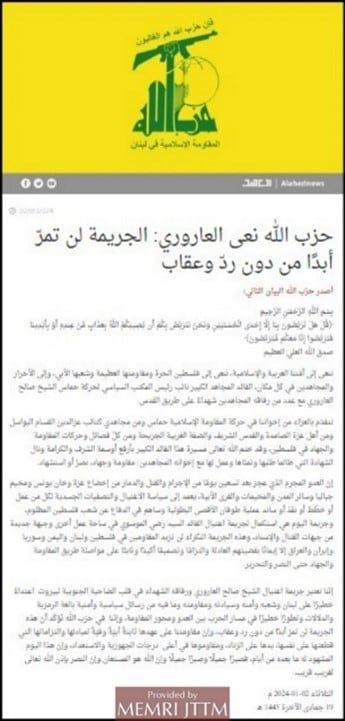
Iran-Backed Iraqi Militias Accuse U.S. Of Backing Killing, Declare Israel Will "Pay Dearly," Vow Support For Palestinian Resistance
Also on January 2, the Iran-backed Iraqi Asa'ib Ahl Al-Haq militia published a condolence message addressing the family of "the martyr the commander" Saleh Al-Arouri, on the occasion of his death and the deaths of three of his bodyguards, "in a treacherous crime by the oppressor enemy in Beirut." The message stated that the operation proved once again "the failure of the Zionist enemy in its confrontation with the members of the resistance in Gaza." It further asserted that, "The crossing of the red lines and [the breaking of] the rules of engagement on the part of the Zionist enemy and its aspiration to broaden the war in the region, with American support, will lead it to pay a heavy price for these stupid acts and exploits." The group stressed its willingness to support "the great Islamic and Arab issue in beloved Palestine and also in Gaza as well as its resistance." It further declared that it stands by the Palestinian people "with the goal of getting rid of this oppressive entity."[2]

The Iran-backed Iraqi Al-Nujaba Movement militia described Al-Arouri as "another martyr of the great battle against the intractable Zionist-American enemy," and stressed its "constant and ongoing [support] for the Palestinian issue and mainly for the members of Hamas." Al-Nujaba added that it supports the Palestinian struggle for freedom and independence and the overthrow of the despicable Zionist occupation," and stressed its readiness "to assist truth against falsehood, whatever the price may be."[3]
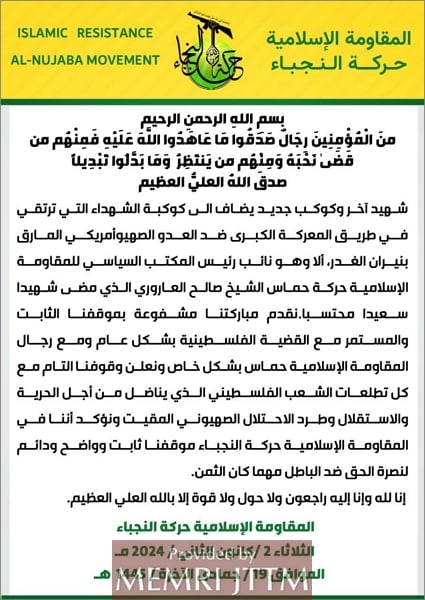
Iraq's Hizbullah Brigades issued a statement condemning the "American-backed Zionist enemy" for its "crime of assassinating" Al-Arouri, along with other mujahideen and civilians, claiming that Israel eliminated the deputy Hamas political chief after its "military failure to confront the resistance fighters of steadfast Gaza." The group called Israel's bombing of Gaza and targeting "civilian sites" in Lebanon, as well as strikes in Syria and Iraq, a "dangerous escalation," charging that these acts are backed by the U.S. with the goal of implementing its "vile plans in the region." The group asked Allah to accept the martyrs, while promising to make sacrifices to "expel the occupiers."[4]
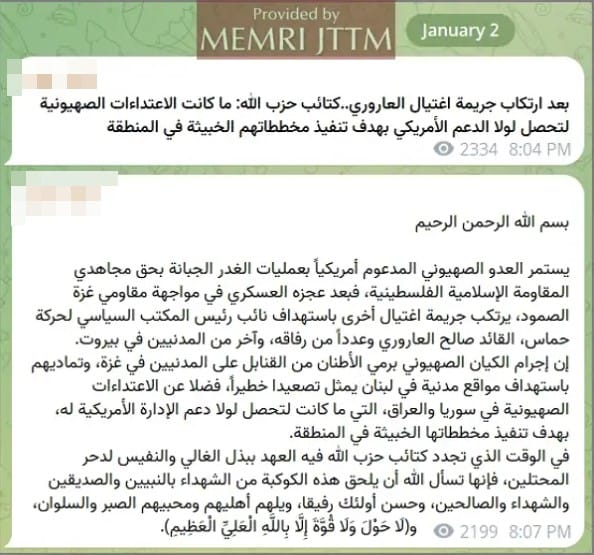
On January 3, the Sayyid Al-Shuhada' Brigades released a statement accusing "the Zionist enemy and evil America behind it" of the "crime" of targeting Al-Arouri and other Qassam fighters in Beirut, describing the slain as "martyrs on the path to Jerusalem." The group noted that the killing coincides with the fourth anniversary of the U.S. killings of General Qasem Soleimani, the commander of Iran's Islamic Revolutionary Guards Corps (IRGC) Quds Force, and Abu Mahdi Al-Muhandis, the deputy leader of Iraq's Popular Mobilization Units (PMU), in Baghdad, an event which Iraqis commemorate "with pride and vigor" throughout the country. Extending condolences to Muslims and "all of humanity" on the death of Al-Arouri, the Sayyid Al-Shuhada' Brigades compared his targeted killing by Israel to that of Soleimani and Al-Muhandis by the U.S., asserting that resorting to "assassination" is a "desperate attempt [by Israel] to cover up its great defeats on all lines of confrontation." Consoling the "Palestinian resistance" on Al-Arouri's death, the Iraqi group asked Allah to grant the mujahideen of the Axis of Resistance "steadfastness and triumph."[5]

Houthis Accuse U.S. Of Supporting Killing, Declare It Will Increase Resistance Steadfastness, Affirm Support For Palestinian And Lebanese Resistance
On January 2, the political office of the Houthi Ansar Allah movement condemned the killing of Al-Arouri and blamed Israel. In its statement, the office claimed that the killing was "a violation of every international law and of all human conventions," and added that Al-Arouri had "a prominent role in the Al-Aqsa Flood operation," and that "the Israeli enemy would not dare to perpetrate this crime without American support and assistance."[6]
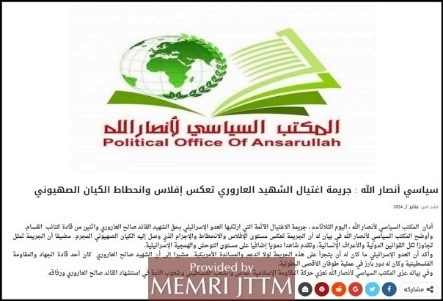
The foreign ministry of the Houthi Ansar Allah movement also issued a statement on January 2, in which it condemned the killing of Al-Arouri and blamed Israel for perpetrating "the crime." It added that the attack was "a dangerous escalation and a flagrant violation of international law and of the sovereignty of Lebanon whose consequences would be bitter and bad." It asserted that such actions by Israel "would only increase the power and steadfastness of the resistance," and called on the international community "to put an end to the Zionist frenzy… which constitutes a great danger to the security and stability of the region and the entire world."[7]

Syrian Jihadis Share Post By Palestinian Writer Accusing Hizbullah Of "Sacrificing" Al-Arouri To Israel
A Telegram post by Jenin-based Palestinian Islamist Mudar Abu Al-Hayja' eulogized Al-Arouri and blamed Lebanese Hizbullah for his death, claiming that the group allowed Israel to kill him because he criticized it for not playing its part in the ongoing war with Israel. Abu Al-Hayja' wrote that Al-Arouri's death was to be expected after he expressed "anger and conflict" with Hizbullah about a month ago, and after Iran's "betrayal." Noting that Al-Arouri – whose name had been proposed as a possible leader of Hamas abroad and who possessed connections inside Gaza and the West Bank – was killed "in the lap" of Hizbullah in Beirut, the Palestinian writer suggested that Hizbullah had sought to "get rid of" Al-Arouri, who was "angry" with the group, and therefore offered him to Israel as a "sacrifice," hoping to receive something in exchange. Noting that the Lebanese group controls the Beirut airport and manages those who pass through it "in a professional security fashion," he wrote: "I had hoped that Sheikh Saleh would not return to Beirut, which he left in a state of conflict with the party of Al-Lat [the name of a pre-Islamic goddess, a pejorative for Hizbullah, literally "the party of Allah"], and with which he used to coordinate, delusionally believing that it would enter into a decisive battle [against Israel] together with him."[8]
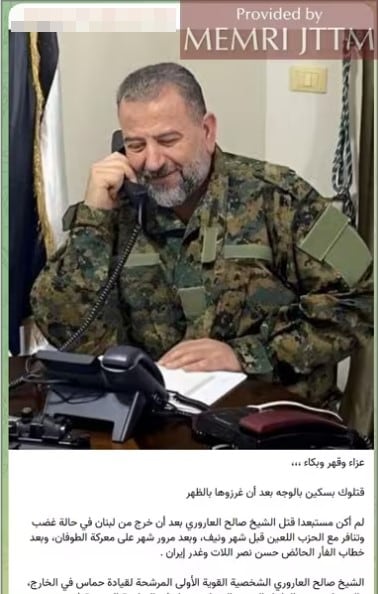
The beginning of Abu Al-Hayja's Telegram post
Abu Al-Hayja's post was shared by several Syrian jihadis, including supporters of Hay'at Tahrir Al-Sham (HTS).[9]
Al-Arouri was also eulogized by Hamas, the Al-Aqsa Martyrs Brigades, and several unofficial Telegram channels supporting Hizbullah.[10]
[1] Alahednews, January 2, 2024.
[2] Telegram, December 3, 2023.
[3] Telegram, January 2, 2024.
[4] Telegram, January 2, 2024.
[5] Telegram, January 3, 2024.
[6] Ansarollah website, January 2, 2024.
[7] Ansarollah website, January 2, 2024.
[8] Telegram, January 2, 2024.
[9] Telegram, January 2, 2024.
[10] See MEMRI JTTM Report: Gaza-Based Jihadi Factions, Lebanese Hizbullah, Houthis, Eulogize Deputy Hamas Political Chief, Say He Was 'Assassinated' In Beirut And Threaten To Avenge Him, January 2, 2024.
The full text of this post is available to subscribers.
Please login or register to request subscription information from MEMRI



